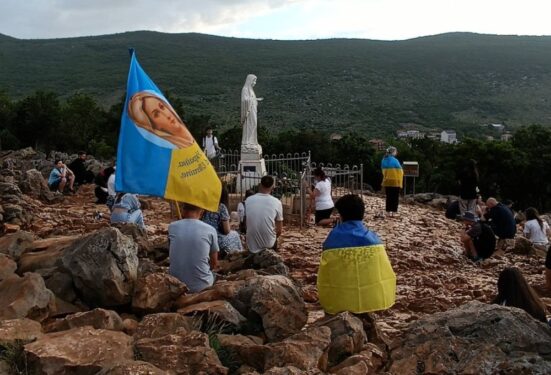
By Gina Christian
(OSV News) — A group of Ukrainian youth have made a pilgrimage to Medjugorje, asking Mary to bring peace as Russia doubles down on its 11-year war in Ukraine and brutally targets civilians.
“This was a drop of water in the desert,” said Basilian Sister Lucia Murashko, who along with 45 youth and 10 adults traveled from the southeastern Ukrainian city of Zaporizhzhia to the site of long-running alleged Marian apparitions in Bosnia and Herzegovina.
Although the Vatican has not ruled on the supernaturality of the phenomena, Pope Francis in 2019 authorized pilgrimages to Medjugorje to provide greater pastoral care to those who visit in hopes of deepening their faith, especially through seeking Mary’s intercession.
And that’s exactly what Sister Lucia and the youth did when they arrived in Medjugorje, after a 27-hour journey that began May 19 with a 17-hour overnight train ride to the western Ukrainian city of Lviv, followed by another 10 hours on a bus to Bosnia and Herzegovina — with a brief stop in Croatia for a day at the seaside — until they at last reached the village.
“We prayed,” Sister Lucia told OSV News, speaking by phone May 24 as the group readied for the return to Zaporizhzhia. “We prayed the rosary every day at 5 a.m. with the children.”
The youth, ranging in age from 14 to 22, also traveled the steep, rocky terrain of “Apparition Hill” (Mount Podbrdo) — walking barefoot for four hours while praying the Stations of the Cross, she said.
“It’s so difficult to walk because of the rocks everywhere … It’s a rocky path, and our children took their shoes off to make an offering (to the Lord), to walk on this very hard path and pray,” Sister Lucia said. “It was so touching. They so intensively asked Mary (for her intercession).”
The youth spent time in daily eucharistic adoration and attended both Roman rite Masses and Ukrainian Catholic Divine Liturgies, the latter celebrated by two Ukrainian Greek Catholic priests who accompanied the group.
One of the priests, Father Oleksandr “Sashko” Bohomaz, had in fact spearheaded the pilgrimage — part of his determination to ensure Ukrainian Catholics can live out their faith despite Russian efforts to eradicate their church and other religious communities in Ukraine.
Ordained in 2016, Father Bohomaz had served in several parishes in and around Melitopol, located some 85 miles south of Zaporizhzhia. Russian forces seized a significant part of the Zaporizhzhia region (though not the city itself) shortly after their full-scale invasion in February 2022, arresting the priest in December 2022 and “deporting” him to Ukraine-held territory, from where he continued his pastoral operations in the region.
That same month, Kremlin-installed authorities in the occupied Zaporizhzhia region “banned” the Ukrainian Greek Catholic Church, the Knights of Columbus and the Catholic humanitarian organization Caritas.
Two Redemptorist priests serving in the Zaporizhzhia region, Fathers Ivan Levitsky and Bohdan Geleta, have been in Russian captivity since November 2022 for refusing to leave their parishioners in Berdyansk. Major Archbishop Sviatoslav Shevchuk, head of the worldwide Ukrainian Greek Catholic Church, has reported both priests have been subjected to torture. According to at least one human rights watch group, Father Levitsky was recently moved to a prison in Russia.
Yet even while under occupation — and despite at least seven interrogations by Russian occupation officials — Father Bohomaz visited parishes, organized Bible studies, led recitations of the rosary, administered the sacraments and coordinated youth camps, saying in an interview shortly after he was exiled from his parish that he “didn’t want to (just) survive” but “to live, even in (the) given conditions.”
A similar spirit prevailed during the wartime Medjugorje pilgrimage; in fact, about five children “went to their first confession,” said Sister Lucia. “We celebrated very much, because we were so happy.”
The rejoicing was a welcome relief from Russia’s relentless attacks on Ukrainian civilians, which have escalated as Western aid has faltered.
Launched in 2014, Russia’s invasion has been declared a genocide in two joint reports by the New Lines Institute and the Raoul Wallenberg Center for Human Rights. The International Criminal Court has issued four arrest warrants against Russian officials, including the nation’s leader, Vladimir Putin.
“We are very tired, sometimes desperate,” admitted Sister Lucia, adding that even during the trip, “we received messages that many soldiers, people we know — relatives and friends — died on the front.”
“We are losing our hope that something can change,” she said. “But here (at Medjugorje), the children pray, and they ask Mary for … their own intentions, but the first intention of each child is peace in Ukraine.”
The time at Medjugorje offered “relief,” and the youth are “more calm now,” she said. “They feel that they left their troubles, their burdens on top of the mountain, near the cross. So I hope it can help us to live more in peace with ourselves too, and in a good relationship with Mary. … She listens to our prayers.”
As the pilgrims return to the city of Zaporizhzhia — where air alerts and explosions constantly sound, and just 80 miles from a Russian-occupied nuclear power plant at which safety conditions have dangerously degraded — Sister Lucia has a message for the world.
“Join us in our prayer,” she pleaded. “Don’t stop praying for peace in Ukraine. There is no other way to stop the war; only by prayer. We ask people to pray and support Ukraine as much as they can, because without your prayers — without the help of God, of Mary — we will not survive.”
